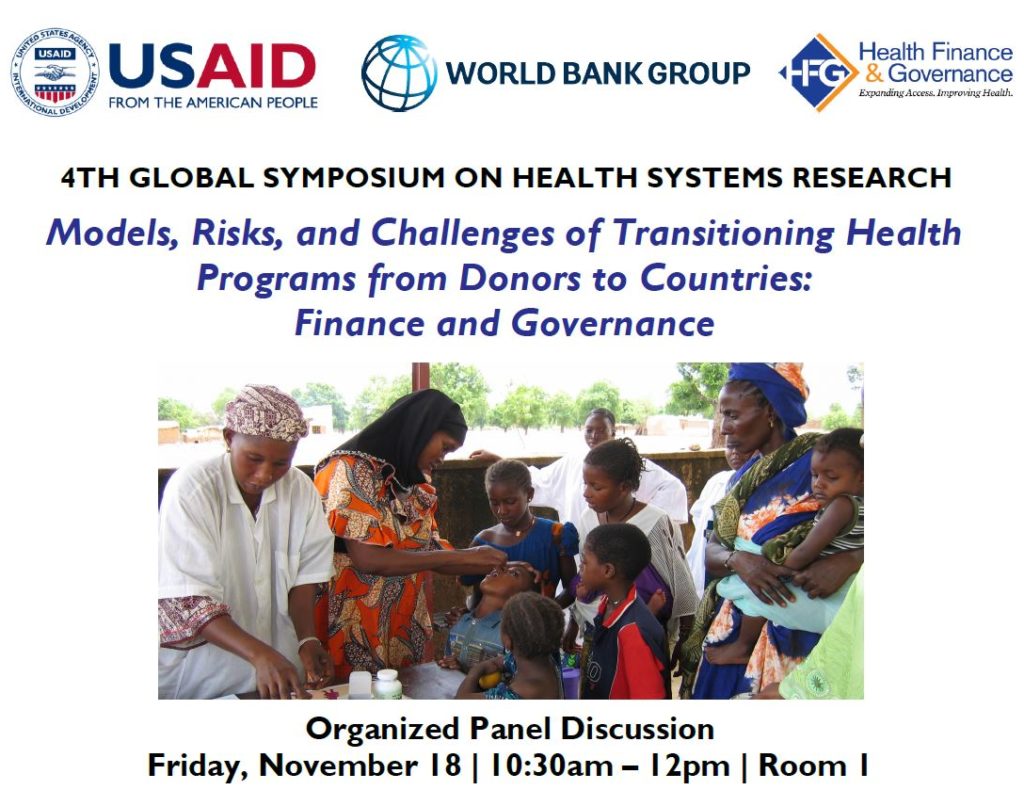Models, Risks, and Challenges of Transitioning Health Programs from Donors to Countries: Finance and Governance
Categories: Announcements
 At the Fourth Global Symposium on Health Systems Research in Vancouver, the HFG project hosted a panel session with the World Bank. The session, “Models, Risks, and Challenges of Transitioning Health Programs from Donors to Countries: Finance and Governance” featured: Tim Evans (World Bank), Bob Fryatt (HFG Project/Abt Associates), Aparna Kollipara (South Africa National Treasury), Giang Thanh Long (Hanoi Economics University), and Sara Bennett (Johns Hopkins).
At the Fourth Global Symposium on Health Systems Research in Vancouver, the HFG project hosted a panel session with the World Bank. The session, “Models, Risks, and Challenges of Transitioning Health Programs from Donors to Countries: Finance and Governance” featured: Tim Evans (World Bank), Bob Fryatt (HFG Project/Abt Associates), Aparna Kollipara (South Africa National Treasury), Giang Thanh Long (Hanoi Economics University), and Sara Bennett (Johns Hopkins).
In the session, health systems experts, researchers, and policymakers discussed the growing evidence behind successful —and less successful—transitions between donor and LMICs in financing essential health services. Speakers explored the challenges faced by policymakers in LMICs transitioning programs from international donor-funded services to completely domestically financed and managed, presenting some of the theory and practice around these transitions.
The use of donor assistance to expand the coverage of health services has led to many successes, but is criticized for undermining domestic resource mobilization and local ownership. International donor assistance for health tends also to be highly targeted: flowing from disease-specific funding sources to meet disease-specific service delivery objectives in low- and middle-income countries (LMICs). This poses a challenge when transitioning the financing, governance, and management of these programs over to ministries of health/governments with health sector-wide objectives.
South Africa and Vietnam are examples of countries using different approaches to handle the financing and governance challenges of transitioning HIV program funding from donor to domestic. Speakers provided country perspectives on the lessons for making such transitions successful, the challenges/risks, and the mechanisms needed, including systems research, for helping future successful transitions. Truly successful transitions to domestic funding will require resilient systems that include mechanisms for monitoring and learning from existing transitions.
Agenda
| 10:30-10:35 | Introduction Tim Evans (Senior Director, Health, Nutrition and Population, World Bank) |
| 10:35-10:55 | Global ‘state of the art’ overview Bob Fryatt (Director, USAID Health Finance and Governance Project, Abt Associates) |
| 10:55-11:15 | Illustrative cases: South Africa and Vietnam Aparna Kollipara (Director, Health and Social Development, National Treasury, South Africa) Giang Thanh Long (Associate Professor, Hanoi Economics University, Vietnam) |
| 11:15-11:35 | Panel discussion Country lessons and challenges around transitioning from donor to domestic resources:
|
| 11:30-11:35 | Key questions going forward Sara Bennett (Professor, Johns Hopkins Bloomberg School of Public Health) |
| 11:35-11:55 | Q&A |
| 11:50-12:00 | Closing Tim Evans (Senior Director, Health, Nutrition and Population, World Bank) |
Speaker Bios

Dr. Tim Evans | Senior Director, Health, Nutrition and Population, World Bank
Tim Evans is the Director for Health, Nutrition and Population at the World Bank. Before joining the World Bank, Dr. Evans was the Dean of the James P. Grant School of Public Health, BRAC University, in Bangladesh. Previously he served as Assistant Director-General at the World Health Organization (WHO), heading the Evidence, Information, Research and Policy Clusters, where he oversaw the production of the annual World Health Report and the staging of the First Global Symposium on Health Systems Research. He is a member of the Health Systems Global Board.

Dr. Bob Fryatt | Project Director, Health Finance and Governance Project, Abt Associates
Bob Fryatt is Director of the U.S. Agency for International Development (USAID)-funded Health Finance and Governance Project. Originally a clinician, Dr. Fryatt has over 25 years of experience in public health and social policy in low-, mid-, and high-income countries in NGO, government, and multilateral settings. He has worked with the U.K. Department for International Development and the World Bank, served as an adviser to the South African Ministry of Health, and was Coordinator for the International Health Partnership and the High-Level Taskforce on Innovative Financing for Health Systems at the WHO.

Aparna Kollipara, MPH | Director, Health and Social Development, National Treasury, South Africa
Aparna Kollipara has worked for six years in the Health Directorate of the Public Finance Division of the South African National Treasury. As the Director for Health, she works with the National Department of Health on financing and policy issues including National Health Insurance. She has worked for the Namibian Ministry of Health, US Centers for Disease Control and Prevention, and USAID’s Health Policy Initiative, and consulted for the Government of Trinidad and Tobago on HIV/AIDS financing. She holds an MPH Health Policy and Management from Harvard, and an MSc Economic History from London School of Economics.

Dr. Giang Thanh Long | Associate Professor, Hanoi National Economics University, Vietnam
Giang Thanh Long is Associate Professor and Director of the Institute of Public Policy and Management at the Hanoi Economics University, a Senior Researcher at the Institute of Social and Medical Studies in Hanoi, and an Affiliate Research Fellow at the Oxford Institute of Population Ageing. His research includes the economics of aging and health for the aging, and actuarial and micro-simulation techniques to provide evidence-based policy studies. Dr. Long helped draft the Vietnam Social Protection Strategy (2011-2020), and was a key member of the taskforce behind Vietnam’s social assistance system reform.

Dr. Sara Bennett | Associate Professor, Johns Hopkins Bloomberg School of Public Health
Sara Bennett is a Professor of health systems at Johns Hopkins Bloomberg School of Public Health, where she is also Director of the PhD Program and Associate Director of the Health Systems Program. Sara has broad interests in health systems research encompassing health financing, human resources for health, aid modalities, sustainability, capacity development and evidence to policy processes. She is an editor of the journal Health Policy and Planning. She is the Chair of the Board of Health Systems Global.



